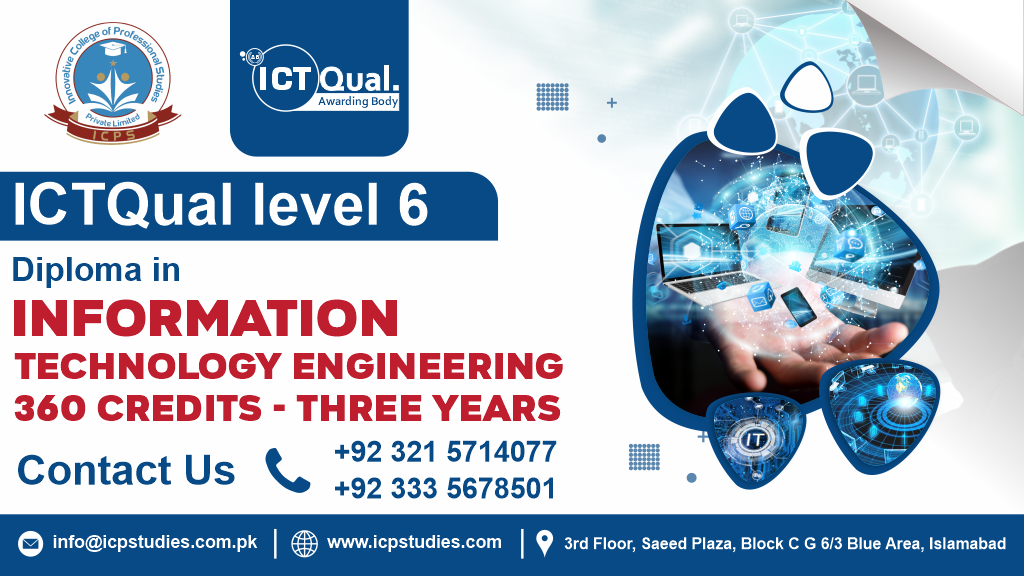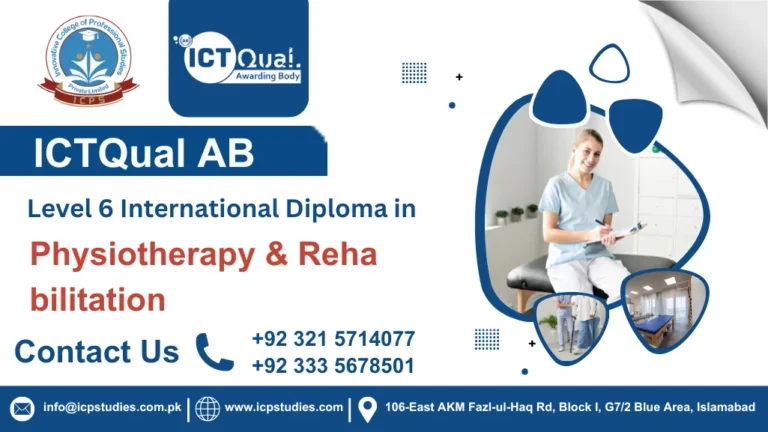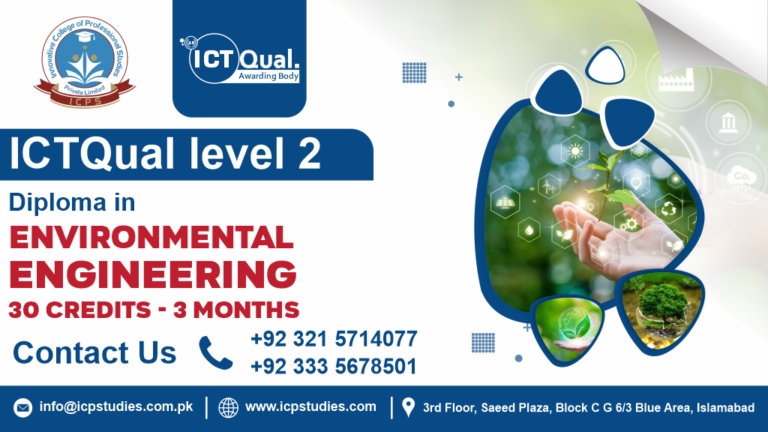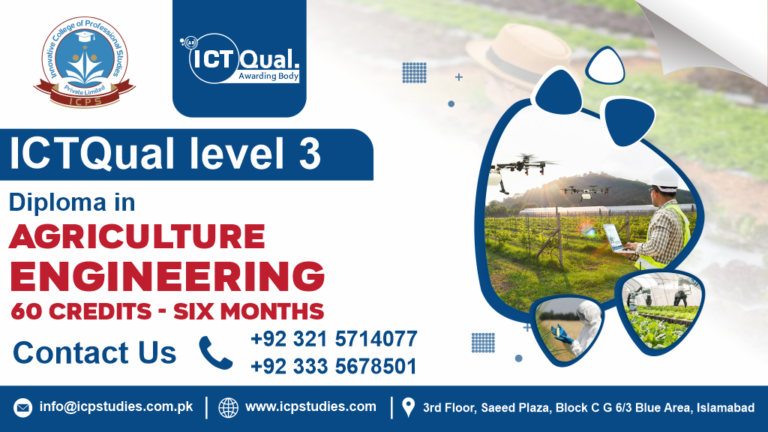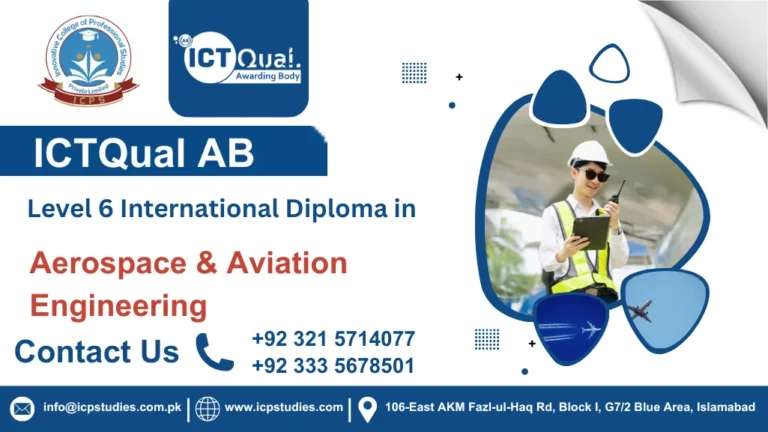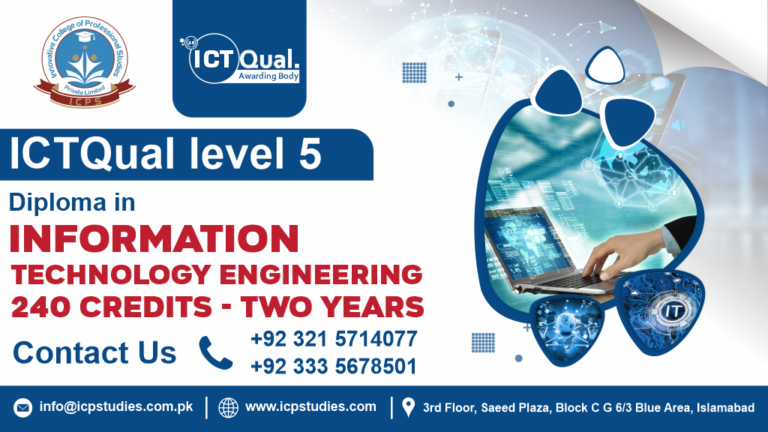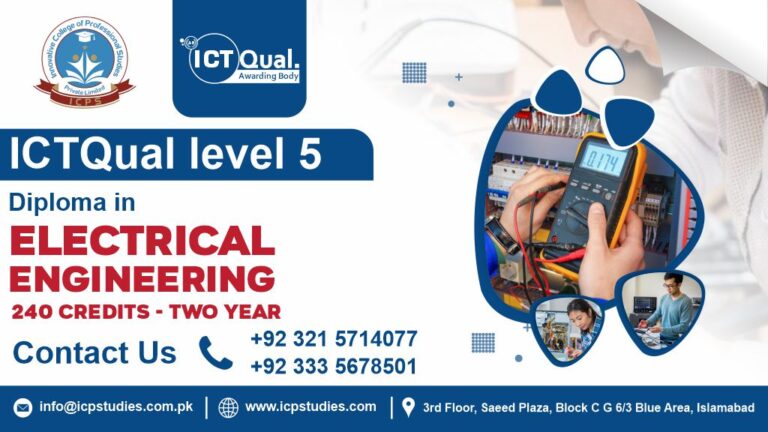The ICTQual Level 6 Diploma in Information Technology Engineering (360 Credits – Three Years) is a specialized qualification designed for individuals looking to develop advanced knowledge and skills in IT engineering. This program provides students with an in-depth understanding of cutting-edge technologies and prepares them for leadership roles in the dynamic world of IT. Whether you’re already working in IT or looking to enter the field, this course offers a structured pathway to expertise in Information Technology Engineering.
The ICTQual Level 6 Diploma is equivalent to the final year of a bachelor’s degree in Information Technology Engineering. It is an intensive three-year program that focuses on both theoretical concepts and practical skills, covering various aspects of IT infrastructure, systems management, network design, and software engineering. The course is designed to provide students with the skills to analyze complex IT problems, design and implement innovative solutions, and manage large-scale IT projects.
The ICTQual Level 6 Diploma in Information Technology Engineering is a rigorous and rewarding program that equips students with the advanced skills necessary to succeed in the rapidly evolving IT industry. With comprehensive coverage of both foundational principles and cutting-edge technologies, this diploma is ideal for anyone seeking to advance their career in IT engineering. Whether you’re looking to specialize in software development, network management, cloud computing, or AI, this qualification provides the expertise and practical experience you need to succeed in the modern IT landscape.
All About ICTQual Level 6 Diploma in Information Technology Engineering 360 Credits – Three Years
Course Overview
The ICTQual Level 6 Diploma in Information Technology Engineering is a comprehensive, three-year program designed for individuals aiming to develop advanced expertise in the dynamic field of IT engineering. This diploma equips students with the technical skills, problem-solving abilities, and industry knowledge necessary to excel in a wide range of IT roles.
Over the course of three years, students will explore foundational principles of computer systems, software development, network design, and cybersecurity while diving into more specialized areas like cloud computing, artificial intelligence, and IT project management. With a focus on both theoretical knowledge and practical skills, this qualification ensures that graduates are well-prepared for leadership roles in the ever-evolving IT sector.
This Level 6 qualification is equivalent to the final year of a bachelor’s degree, making it an ideal choice for those looking to advance their career, specialize in IT engineering, or pursue further studies in the field. Whether you are an experienced IT professional looking to upskill or a newcomer eager to break into the IT industry, the ICTQual Level 6 Diploma in Information Technology Engineering provides a robust foundation for your future career.
Study Units
Year 1: Foundation and Core Concepts
- Introduction to Information Technology
- Computer Architecture and Hardware
- Operating Systems Fundamentals
- Networking Fundamentals
- Programming Principles
- Database Design and Management
- Web Technologies and Development
- IT Support and Troubleshooting
- Mathematics for IT
- Introduction to Cybersecurity
- Systems Analysis and Design
- Project Management Fundamentals
Year 2: Specialized IT Engineering
- Advanced Networking and Protocols
- Cloud Computing and Virtualization
- Advanced Programming Techniques
- Advanced Database Systems
- Mobile Application Development
- System Security and Risk Management
- Enterprise IT Infrastructure
- Software Engineering and Development Lifecycle
- IT Management and Governance
- Business Intelligence and Data Analytics
- Human-Computer Interaction
- Ethical and Legal Issues in IT
Year 3: Professional Development and Advanced Implementation
- Advanced Networking Technologies
- Artificial Intelligence and Machine Learning
- Cybersecurity for IT Professionals
- Cloud Infrastructure and Services
- Project Management for IT Projects
- Advanced Software Development Practices
- System Integration and Implementation
- IT Research Methodologies
- Professional Practice and Ethics
- Internship/Industry Placement
- Capstone Project I: System Design and Development
- Capstone Project II: Evaluation and Implementation
To be eligible for the ICTQual Level 6 Diploma in Information Technology Engineering, candidates must meet the following entry requirements:
1. Academic Qualifications
- A Level 5 qualification in Information Technology, Computing, Engineering, or a related field, such as:
- Higher National Diploma (HND) in IT or Engineering
- Foundation Degree in IT or Engineering
- Associate Degree in Computer Science or a related discipline
- Alternatively, applicants with equivalent qualifications in technical or engineering disciplines will also be considered.
2. Practical Experience
- Relevant work experience in IT or a related field is advantageous but not mandatory. Candidates with practical knowledge in areas such as IT support, network management, or software development will be well-positioned to succeed in the program.
3. Mathematical and Technical Proficiency
- A strong understanding of basic mathematics (e.g., algebra, calculus) is recommended, as the program involves technical courses such as computer systems, networking, and programming.
- Familiarity with basic IT concepts, such as computer hardware, software, and networking, is beneficial.
4. English Language Proficiency
- If English is not your first language, you will need to demonstrate proficiency in English through an English language test (e.g., IELTS, TOEFL) with a minimum score as specified by the institution offering the program. Typically, this would be an IELTS score of 6.0 or equivalent.
5. Other Considerations
- Personal Statement: Many institutions may require a personal statement or motivation letter outlining your reasons for pursuing the diploma, your career aspirations, and how the program aligns with your goals.
- Interview: In some cases, applicants may be required to attend an interview to assess their suitability for the course, especially if they have non-standard qualifications or experience.
6. Additional Requirements (if applicable)
- Some institutions may require a portfolio of work or proof of prior projects in IT or related fields, especially for candidates without formal academic qualifications in IT or engineering.
It is recommended that prospective students check with the institution offering the program for specific entry requirements, as they may vary slightly depending on the institution and the country.
The ICTQual Level 6 Diploma in Information Technology Engineering (360 Credits – Three Years) is designed for a wide range of individuals seeking to advance their careers in IT engineering. This course is ideal for:
1. IT Professionals Seeking Career Advancement
- Experienced IT practitioners looking to deepen their expertise and move into higher-level technical roles or management positions within the IT sector. This diploma is an excellent choice for those aiming to become IT engineers, systems architects, or network specialists.
2. Graduates in IT or Related Fields
- Recent graduates with a Level 5 qualification in Information Technology, Computing, Engineering, or a related field who want to specialize further in IT engineering and gain advanced skills for more complex roles in the industry.
3. Technicians and System Administrators
- IT technicians and system administrators who wish to expand their knowledge and expertise in areas such as network management, cloud computing, cybersecurity, and software development. This course can help them progress into more senior positions, such as IT manager or solutions architect.
4. Aspiring IT Engineers and Software Developers
- Individuals looking to enter the IT engineering field with a focus on systems design, programming, network infrastructure, or cloud services. Whether you’re starting from scratch or transitioning from another IT discipline, this program offers the necessary foundation and specialized skills.
5. Career Changers from Technical or Engineering Backgrounds
- Those with a background in engineering or technical fields who want to pivot into the rapidly growing IT sector. If you have experience in fields like mechanical engineering, electronics, or telecommunications, this course will help you gain the IT engineering knowledge needed to make a successful transition.
6. Entrepreneurs and Innovators
- Aspiring entrepreneurs looking to develop their own IT solutions or technology startups. The course provides a strong foundation in IT project management, systems engineering, and innovation, making it ideal for those looking to bring new technology ideas to market.
7. Individuals Interested in Specializing in Emerging Technologies
- Those interested in cutting-edge technologies such as artificial intelligence, machine learning, cloud computing, and cybersecurity. This diploma covers advanced topics that prepare students for roles in these rapidly evolving fields.
In summary, the ICTQual Level 6 Diploma in Information Technology Engineering is perfect for anyone who wants to advance in the IT sector, whether you’re aiming to move into senior technical roles, manage IT projects, or specialize in the latest technology trends. Whether you are just starting or have a technical background, this course will provide you with the skills and knowledge required to succeed in today’s competitive IT landscape.
Learning Outcomes
Year 1: Foundation and Core Concepts
- Introduction to Information Technology: Gain a comprehensive understanding of IT systems, their components, and how hardware and software interact within modern IT environments.
- Computer Architecture and Hardware: Learn the structure and functionality of computer hardware, and how it supports the execution of software applications.
- Operating Systems Fundamentals: Acquire foundational knowledge of operating system concepts, functions, and the administration of operating systems.
- Networking Fundamentals: Develop an understanding of essential networking concepts, protocols, and basic network design principles.
- Programming Principles: Master the basics of programming, applying fundamental techniques to develop simple software solutions.
- Database Design and Management: Learn to design, implement, and manage relational databases using SQL for data storage and retrieval.
- Web Technologies and Development: Build and deploy basic web applications using HTML, CSS, and JavaScript to create functional web interfaces.
- IT Support and Troubleshooting: Develop skills to identify, diagnose, and resolve common hardware and software issues in IT systems.
- Mathematics for IT: Apply mathematical concepts to solve IT-related problems, particularly in areas such as algorithms, data structures, and system optimization.
- Introduction to Cybersecurity: Understand the fundamentals of cybersecurity, including common threats and basic protection techniques.
- Systems Analysis and Design: Learn to analyze business requirements and design IT systems that meet these needs.
- Project Management Fundamentals: Gain an understanding of basic project management principles and their application in managing IT projects.
Year 2: Specialized IT Engineering
- Advanced Networking and Protocols: Design and configure advanced networking systems, focusing on modern protocols and their application in large-scale networks.
- Cloud Computing and Virtualization: Understand the principles of cloud computing models, and implement virtualization technologies to create flexible, scalable IT environments.
- Advanced Programming Techniques: Apply advanced programming techniques, such as object-oriented programming (OOP) and design patterns, to develop robust software solutions.
- Advanced Database Systems: Master the design and optimization of complex database systems, tailored to meet the needs of enterprise-level applications.
- Mobile Application Development: Develop mobile applications for different platforms, focusing on user interface design, performance optimization, and deployment strategies.
- System Security and Risk Management: Learn to assess and mitigate security risks by implementing security measures to protect IT systems from threats and vulnerabilities.
- Enterprise IT Infrastructure: Design and manage enterprise-scale IT infrastructures that support business operations, ensuring high availability and performance.
- Software Engineering and Development Lifecycle: Understand and apply software engineering principles throughout the software development lifecycle, from requirements gathering to deployment.
- IT Management and Governance: Learn how to implement effective IT management strategies and governance models that align IT operations with business goals and compliance requirements.
- Business Intelligence and Data Analytics: Analyze data to extract valuable business insights, leveraging data analytics tools to support decision-making processes.
- Human-Computer Interaction: Design and optimize user-friendly interfaces, focusing on improving user experience based on human-computer interaction principles.
- Ethical and Legal Issues in IT: Understand the ethical dilemmas and legal requirements in the IT industry, and apply them in practice to ensure compliance and responsible conduct.
Year 3: Professional Development and Advanced Implementation
- Advanced Networking Technologies: Gain hands-on experience in designing and implementing advanced networking technologies, including Software-Defined Networking (SDN) and 5G networks.
- Artificial Intelligence and Machine Learning: Apply AI and machine learning algorithms to solve complex IT engineering problems, focusing on automation, pattern recognition, and data-driven decision-making.
- Cybersecurity for IT Professionals: Master advanced cybersecurity concepts and techniques, implementing security measures to protect IT systems in enterprise environments.
- Cloud Infrastructure and Services: Develop expertise in managing cloud infrastructure and services, optimizing business operations by utilizing cloud platforms.
- Project Management for IT Projects: Lead and manage complex IT projects, applying advanced project management methodologies such as Agile, Scrum, and Lean to ensure successful outcomes.
- Advanced Software Development Practices: Apply best practices in software development, focusing on creating high-quality, maintainable, and scalable software solutions.
- System Integration and Implementation: Learn how to integrate disparate IT systems into a unified solution, ensuring compatibility, optimal performance, and seamless interaction between components.
- IT Research Methodologies: Conduct research in IT-related fields, using appropriate methodologies to investigate problems and propose solutions based on data and evidence.
- Professional Practice and Ethics: Demonstrate professionalism, ethical decision-making, and leadership in the IT industry, ensuring responsible conduct in all aspects of IT engineering.
- Internship/Industry Placement: Apply theoretical knowledge in a real-world IT environment through an internship or industry placement, gaining practical experience and exposure to professional IT practices.
- Capstone Project I: System Design and Development: Design and develop a fully functional IT system or solution, applying learned concepts to real-world requirements.
- Capstone Project II: Evaluation and Implementation: Evaluate and implement the developed IT system, incorporating feedback and making improvements to ensure optimal functionality and user satisfaction.
These learning outcomes ensure that students who complete the ICTQual Level 6 Diploma in Information Technology Engineering will possess a comprehensive, advanced skill set to excel in IT engineering, from system design and development to cybersecurity and cloud management. The course prepares graduates for leadership roles and technical positions in the ever-evolving IT industry.
FAQs about ICTQual Level 6 Diploma in Information Technology Engineering 360 Credits – Three Years

